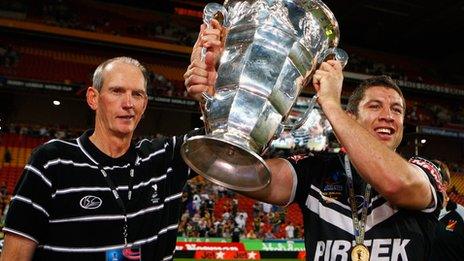Rugby League World Cup 2013: A joy that must not be wasted
- Published
- comments
Australia thrash NZ to win 2013 World Cup
There were 74,468 inside Old Trafford on Saturday to witness one of the most ruthless rugby league displays in many years as Australia thrashed New Zealand 34-2.
If the spectacle was a little disappointing, then it was at least encouraging that Saturday's Rugby League World Cup final was played in front of the largest crowd to attend an international fixture.
It turned into an exhibition of Australia's brilliance as they avenged their defeat in the 2008 final, but it was also the final act of a tournament that has been a celebration of the sport.
But has it answered the questions that the game has struggled with for generations? And can this tournament be the springboard that finally lifts the sport to another level?
By general consent the 14th staging of the World Cup, first held in 1954 in France when Britain were the winners, has been the best - 14 teams competing in 28 games, scoring 214 tries over 35 memorable days.
"What I really hope more than anything is that it has reminded rugby league fans how great their sport is," said tournament general manager Sally Bolton.
Whereas the last tournament over here in 2000 was a sparsely attended event dogged by atrocious weather and transport headaches, this one gave us five weeks when the sport aroused passions, created friendships and dazzled with the brilliance of the skills.
The Fijians praying with their opponents immediately after the final whistle, the majesty of the Hakas, teams sharing a dressing room minutes after battering into each other - there has been what tournament director and Rugby Football League chief executive Nigel Wood described as "a restoration of the something of the Corinthian spirit".
There was the epic, ageless semi-final between England and New Zealand at Wembley that the Kiwis won with seconds remaining, a game Wood described as the best in either code for years.
There were eight sell-outs and several ground records, while a total of more than 450,000 fans watched the competition.
Bolton is confident that the tournament will post a profit in excess of the £3.2m made from the last World Cup in 2008 (although not as much as the £5m reported elsewhere).
Over and above the figures on the balance sheet, there is the hope that some of the fans who turned out to watch and many of the businesses that paid to support the World Cup will remain long after it has finished.
"In theory our role has been just to deliver an excellent tournament, but our team has always been focused on the legacy that is left behind for the sport," added Bolton.
"When we talk about the big 'L word' - legacy - we want to be able to point to something tangible."
Bolton is keen to stress that 35-40% of ticket sales for the tournament came from postcodes outside the sport's traditional heartland in the north of England, as well as to emphasise the positive response from sponsors.
Rugby League World Cup: The best tries from 2013
One of her few regrets is that more games were not shown live on the BBC - but figures for England's matches peaked at more than two million, pleasing both the broadcaster and the organisers.
England's agonising semi-final defeat at Wembley was a missed opportunity for the sport here to really press home the momentum generated during the tournament. Reaching the final would have given the team - and thus the game in a wider sense - a week of high-profile build-up.
"For our sport, this World Cup is doing tremendous things," said England coach Steve McNamara after his team's defeat.
"For young kids at grassroots level who are watching, and dream that one day this could be them, I hope it inspires them."
Wood is convinced the World Cup has gifted rugby league an unprecedented two-fold opportunity.
"The World Cup has exceeded everyone's expectations no matter what criteria you use," said Wood.
"It can provide a really solid launchpad for the game domestically for the next few years and also for the international federation, with the way that its coffers have been filled for a new phase of its development cycle."
The sport in England is in need of a lift. Changes in the NRL salary cap in Australia mean several top players are heading down under, while Super League remains without a major sponsor.
London Broncos have applied to go into administration and thus the game's top-flight presence in the capital - 32 years and counting, and something much valued by the RFL - is extremely uncertain.
The domestic competition in England is in the process of restructuring but at a meeting of the 14 clubs in October to agree changes six of them walked out.
It is crucial that the domestic game does not become mired in a squabble that could undermine the opportunity the World Cup has created.
"There is a legitimate debate going on within the domestic competition as to the right structure but I am convinced that everyone wants what is best for rugby league," said Wood.
Wood is also deputy chairman of the Rugby League International Federation, external and if there are difficult challenges domestically, then there are arguably greater issues regarding the game at the top level.
"I hope that the acclaim the tournament has received should persuade anyone that international rugby has a vibrant and positive contribution to make to the overall offer to sports fans," added Wood.
"But the international federation has some significant decisions to make."
Top of this is putting a calendar of fixtures in place that will take us through to the next World Cup in 2017 - both for the top teams and those underneath them.
This is of vital importance because as this World Cup has shown, no matter how intelligently you structure the tournament the fact that three teams are so much better than the rest will lead to one-sided games at some point.
In 2013, three of the quarter-finals were heavily one-sided, while Australia defeated Fiji 64-0 in one of the semi-finals.
"Most people would like the big three to become the big six or eight but four would be a marked improvement," added Wood. "We need resources and a strategic plan for those nations most likely to fill those slots."
There is arguably a second tier now that includes the likes of France, Fiji, Tonga, Papua New Guinea and Samoa, while sides such as Scotland, Italy and the USA all made huge strides at the World Cup.
A decision is expected early next year on where the next World Cup will be held, with a joint bid from Australia and New Zealand up against one from South Africa.
The 2014 Four Nations is expected to take place down under, with talk that Fiji and Samoa will play off to decide who joins the Kangaroos, Kiwis and English.
It is also rumoured that a Great Britain side will tour Australia in 2015, with another Four Nations in Europe the following year.
England full-back Sam Tomkins wants more games against top opposition to help strengthen his team.
"We need more tough tests - we are only going to get better that way," said Tomkins, who now moves to the New Zealand Warriors in the NRL.
"The Aussies and Kiwis are playing each other mid-season, whereas we have a year off when we are playing Wales and the like, and it doesn't help us."
But it is crucial that there are structures in place to ensure the promise shown by developing teams at the World Cup is not wasted. They need a calendar put in place that gives them the incentive to progress.
For example, it is expected that Scotland, Wales, Ireland and France will do battle in the European Cup competition with the winners going into the 2016 Four Nations to be played in the northern hemisphere alongside England, Australia and New Zealand.
"This World Cup has been so big and every nation has done their bit to help grow the game," said Australia captain Cameron Smith after his team's final victory.
His nation has now won 10 of the 14 World Cups. For the good of the game, it would be great if the lasting legacy of this tournament is to ensure it is a lot harder for future Australia teams to get their hands on the trophy.
- Published30 November 2013
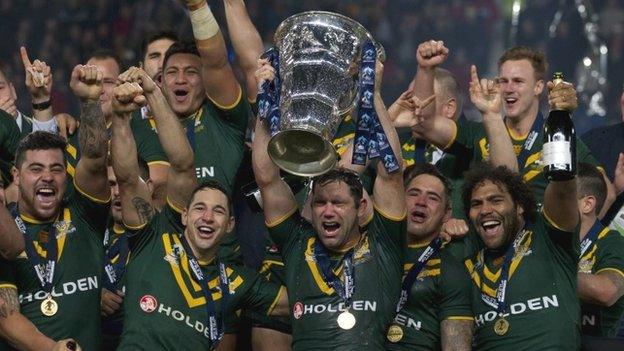
- Published30 November 2013
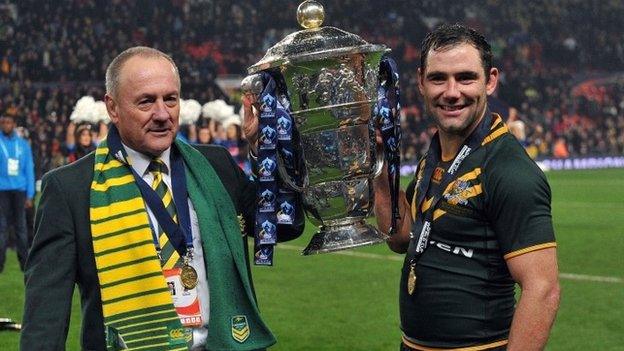
- Published13 November 2013
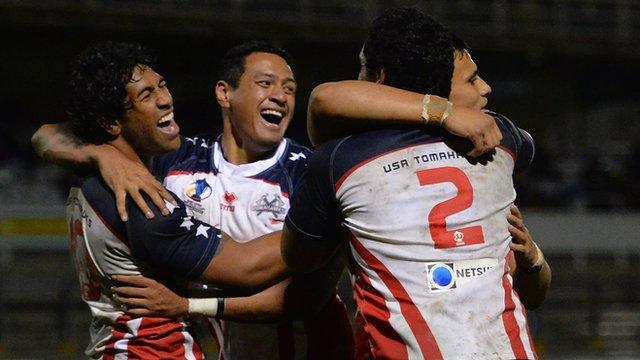
- Published1 November 2015
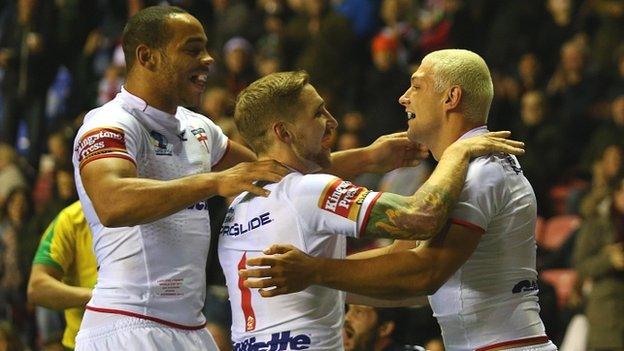
- Published21 May 2019
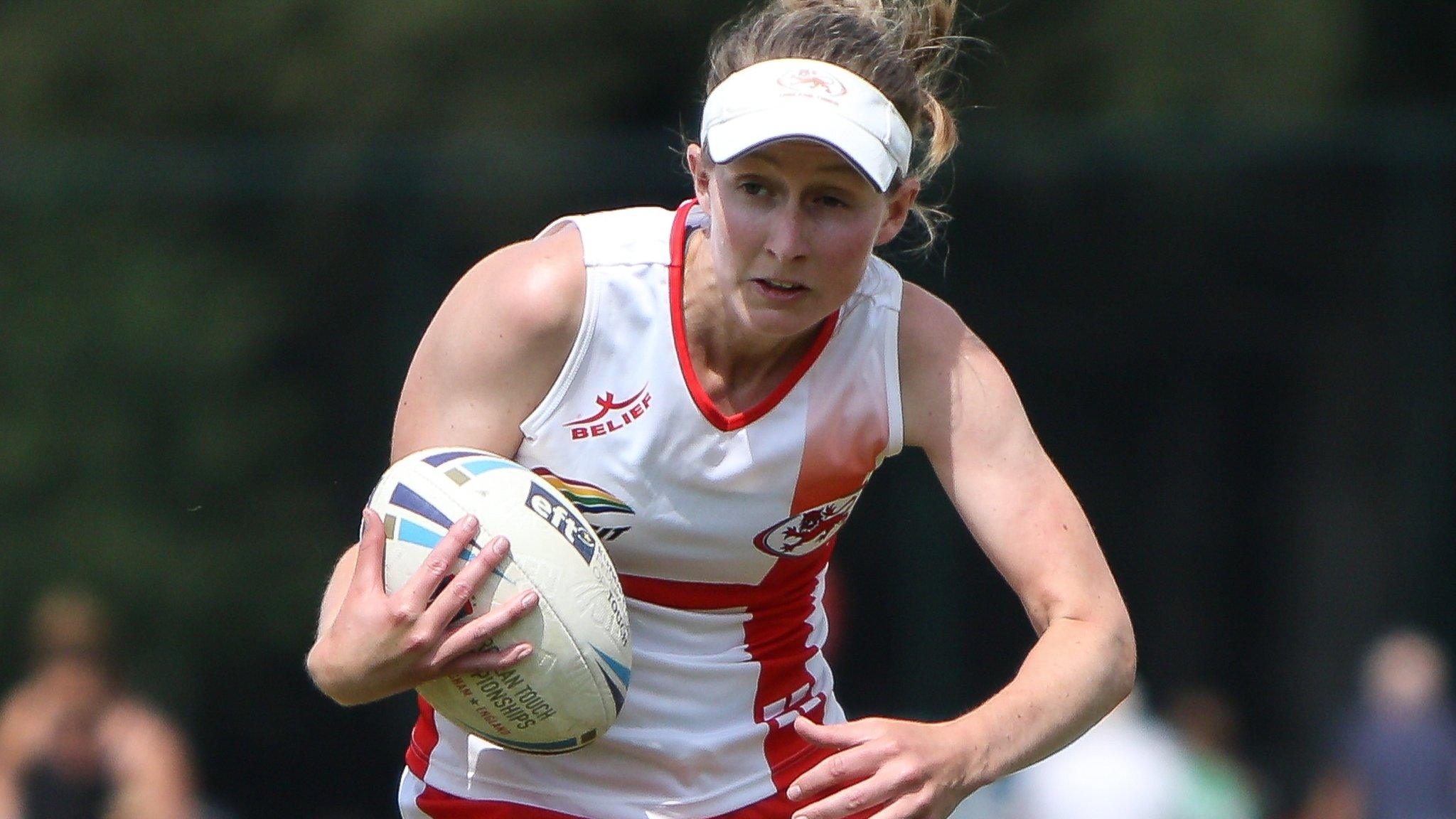
- Published30 November 2013
